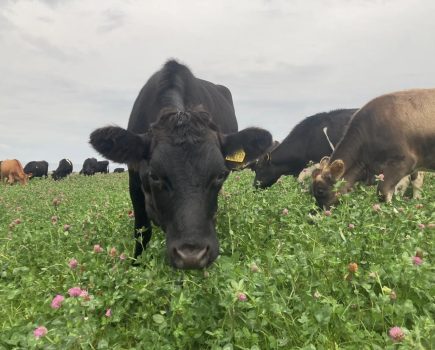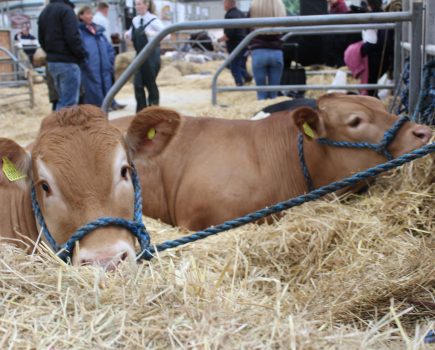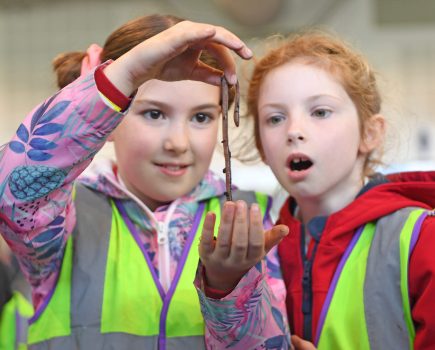MARCH 20, 2008: An extraordinary attack on smallholders by NFU president Peter Kendall provoked a vigorous reaction. Then the NFU claimed he had beenmisquoted. Here’s the story…
It’s not often that smallholders get headline treatment in a national newspaper. But they came under the spotlight in The Times on February 18 – and the article caused a storm of protest.The newspaper reported that the NFU regarded the growing number of “hobby farmers” who keep livestock mainly as pets as a threat to the future of British agriculture unless they undergo tough new licensing and inspection regimes.Countryside editor Valerie Elliot quoted NFU President Peter Kendall as saying: “We have to ask, should hobby farmers be allowed to jeopardise the professional industry?“In these days of bluetongue, foot and mouth disease, avian flu and increased disease threats from climate change, should these keepers not need a licence or some form of competence, to look after farm animals?”Mr Kendall was reported as saying that the NFU had made a formal request for new supervision of hobby farmers in a submission to the Anderson inquiry, which is examining the handling of last year’s Surrey foot and mouth outbbreak.There was a furious reaction from many smallholders. The Sheep Protection Society told The Times that ‘hobby farmers’ should not be demonised. Mary Marshall, who represents the Smallholders Forum, was quoted as saying: “Hobby farmers often spend more on proper prevention practices than do commercial farmers, and tend to have more veterinary involvement and spend more time per animal.” The NFU later issued a statement saying Mr Kendall had been “misquoted”. It said it was putting right “incorrect newspaper reports that claimed Union President Peter Kendall had called for smallholders to be licensed”.It said:”Mr Kendall was quoted in The Times on February 18 as saying that ‘hobby farmers’ with livestock should be expected to have a licence or certificate, to reduce the risk of their activities impacting on professional livestock farmers.”“His remarks had been taken out of context and distorted to create controversy.“The President had, in fact, said that it may be sensible to have a debate on whether licensing, certification or other policy options could reduce the risk of diseases – such as foot and mouth – resurrecting.“The NFU does not at present favour licensing livestock keepers, as we consider that the burden would be disproportionate to the benefit.“If we were to consider it, it would be on the basis that any requirements would apply to all livestock keepers. However, it might be possible to make allowance in the requirements for farmers participating in recognised farm assurance schemes, to avoid duplication.”The NFU statement said: “We are well aware that the existing inspection regime makes no distinction between livestock farmers on the basis of the number of animals kept and we do not favour any change in that situation.”It said the NFU does not endorse the expression ‘hobby farmers’ as shorthand for small-scale farmers, as there was no correlation between farm size, animal welfare and record keeping.It said the thousands of small scale farms in England and Wales were “an important part of rural communities and cared for livestock to the highest standards”.But it said there could be a minority of farms – big and small – that did not, and were not well enough equipped to identify disease or other risks.This could have significant implications under the government’s cost-sharing agenda, as farmers who invested in measures to reduce the risk of disease could end up paying for the consequences of farmers who did not, said the NFU.“How to address that situation, in ways that do not add to the already huge regulatory burden on livestock farmers of all shapes and sizes, needs to be the subject of debate.”Your views: KATIE THEAR, a former CS editor and author of many smallholding books, said: “We’ve seen it all before! Whenever the large farming sector feels threatened by the possibility of new controls on its activities, it reacts by blaming smallholders for outbreaks of disease.“They don’t call them smallholders, or small or part-time farmers. They use a derogatory term ‘hobby farmers’, implying that they’re not serious or informed about animal husbandry but merely playing at keeping animals. “Practically all the serious outbreaks of animal disease have come from badly run commercial units. It’s not surprising that these outbreaks occur where livestock are kept intensively and shipped around the country for various reasons. Recent examples include the foot and mouth outbreak in 2001, where four million animals were slaughtered, and which originated in a commercial pig unit. My experience of talking with smallholders over many years, is how well informed they are and how much they care for their livestock and poultry.DS of Middlesex posted this on The Times website:Smaller farmers are much more likely to notice a sick animal and bother to call the vet or pay for medicines. To say they are untrained is an ill informed insult. Small ‘hobby farmers’ often have second incomes, which mean they can pay for training, veterinary examinations and equipment.They also have the freedom to offer more thorough care by not being stretched in caring for 500+ sheep to one person. The NFU could have offered training and support to ensure these farmers meet their standards, rather than suggest additional legislation, something farmers aren’t usually keen on. Incidentally, one doesn’t need to have any training to acquire a large farm and fill it with livestock. Nor is every commercial farmer trained or even practising as they were taught. The NFU knows this perfectly well.PAUL ROGER, Senior Vice President of the Sheep Veterinary Society, said:There is a range of farming enterprises which stretch from those people who may have one or two animals as grass-cutters through to large, complex and intensive livestock units. Although disease risk is associated with all livestock units, the more worrying aspects of livestock keeping are not necessarily those associated with the group classically recognised as hobby farmers but rather with the indeterminate and grey grouping where animals may be raised for home consumption on small pockets of land distant from the home unit, unregistered and with a low level of husbandry and management. By their nature, operating in isolation from agriculture and in some cases not complying with legislation, movements may go unrecorded and unnoticed and disease unrecognised.This is behind the call for licensing of all livestock enterprises. Those already practising good husbandry and management are unlikely to need to acquire new skills or incur greater costs with the introduction of a licensing system. Indeed, it could be used to reduce costs by centralising inspections under one body.MARY CRITCHLEY, founder of the website www.warmwell.com, which carries extensive information about animal diseases, said:Perhaps Peter Kendall’s remarks stem partly from that unfortunate mistake in the Foot and Mouth Disease Epidemiological Report, September 21, 2007, which wrongly blamed the ‘hobby farmer’ of IP4 for ignoring the presence of foot and mouth and swanning off on holiday. The next report quietly announced “ …relating to the identification of IP4. This case was identified as a result of the owner noticing and reporting suspicion of disease in the cattle, and not as previously reported. We apologise for this error.” It was too late. The farmer had, in fact, done everything possible to check for and report disease, but there were contemptuous comments in The Scotsman and elsewhere about the “bunch of hobby farmers”. And now the NFU president suggests that hobby farmers are letting in disease by the back door. Defra’s front door concept of ‘biosecurity’ attempts to achieve a barrier to disease – but a little common sense is needed too. When human parents want to protect children against disease, they think in terms of good diet, decent exercise, fresh air and the development of a strong immune system. The buzzword in commercial farming is ‘efficiency’. This means more milk, faster growth,the largest possible stocking density, high protein food pumped in during short lives and, of course, the Iron Curtain of biosecurity. The result may be ‘efficient’, but it can also lead to stress and gastric problems – invariably dealt with by antibiotics. We’re only just beginning to recognise the consequences of the abuse of antibiotics.COLIN HUGHES, of the Shropshire Smallholders Group, said:“Sadly, in this instance, as with most other examples of problems in the farming industry in the past 20 years, the NFU blames everyone apart from looking at their own members. “Most smallholders are well trained and caring individuals who apply the best husbandry practices in the care of their own animals. “Farmers are not obliged to undergo any formal training, and to suggest otherwise is a fabrication. Most of them simply learn on the job from their fathers or other close relations Bad practice is therefore perpetuated from generation to generation. “The farming community was responsible for BSE and wormer resistant strains of sheep are fast developing in the UK. There will always be individuals who ignore regulations in any situation and the 2001 FMD outbreak saw many farmers who were guilty of poor practice. Mr Kendall seems to be suggesting that farmers operate in a well trained and professional manner. Facts relating to FMD and, more recently, avian flu suggest otherwise.”ANGELA, of Fair Isle, Shetland, posted this on The Times website:Perhaps the NFU should put as much effort into addressing why there are so many hobby farms around. In a time when the consumer puts as much concern onto the welfare of the beast that ends up on the plate as it does to quality, little choice is left other than hobby farming to ensure access to a high quality product. * See Special Report: A Lack of Leadership.







